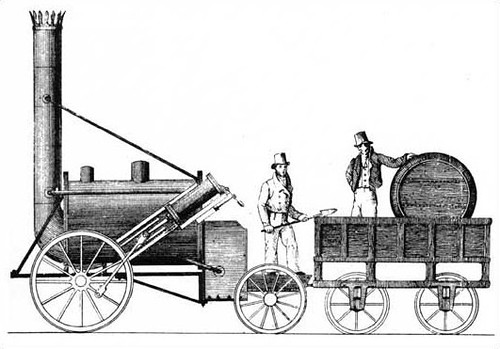
The Stephenson Rocket and the beginning of our obsession with the internal combustion engine
Energy is the ability to do work. Without energy nothing happens. We know this when we are sick, when there is a blackout, or when we run out of fuel. No Energy = No Work.
Before the industrial revolution humanity was constrained by the limited amounts of energy that could be harvested from nature. To power our societies we harnessed the energy of wood, oxen, a little bit of wind and water, our own muscle power and even human slavery. On a human time-scale growth was slow and almost unnoticeable.
The discovery of fossil fuels, however, lifted that constraint and enabled the growth of everything that we see and take for granted today. Trade, infrastructure, cities, modern agriculture, shipping, air transport, technology, human population and even our banking system have all grown exponentially on the back of ever increasing access to fossil fuel energy. Although we like to think that our civilisation today is solely the result of human ingenuity it would never have happened were it not for this free energy subsidy gifted to us from our planet’s geological past.
Thus, the industrial revolution could have been equally described as an energy revolution. From that moment onwards society no longer relied on the finite yearly supply of energy from the sun captured in the form of wood, crops and animals. Instead it had found a seemingly unlimited source of ancient sunlight, captured in the form of oil, coal and gas.
Over the last century we have used this ancient sunlight to build the modern world. It has allowed us to do 70- 100 times more work than would have been possible without it(1). Ironically, although we are utterly dependant upon it, we remain largely ignorant of how much it underpins our lives. Consider how much human labor would be required to push a car 30 miles. Consider that powering a 150-watt bulb would require the constant muscle power of 5 healthy adults(2).
To complicate things we have managed to embed fossil fuels into almost every aspect of our economy and society; plastics, pharmaceuticals, clothing, home heating, electricity generation, water treatment, and most worryingly of all, agriculture. Farming, which was once a source of energy in the form of food for people and animals is now a sink. When everything is taken into account except cooking, ten times more energy is used to produce our food than we get back in return(3). Replacing the fossil energy input in food production with human energy would equate to 1 person working 21 days to produce enough food for 1 day(4). Clearly, at the most basic level, our way of living is absurd, wasteful and unsustainable.
The next few decades will witness the closing chapters of our 200 year love affair with fossil fuels. Peak oil is with us now and will be followed by peak coal and peak gas. In the presentation below, Richard Heinberg, author of numerous books on peak oil, outlines our predicament and explains why we face a second “energy revolution”. Well worth listening to in full.
part 2 | part 3 | part 4 | part 5
Notes & further reading:
1. Rob Hopkins, The Transition Handbook
2. Richard Heinberg, The Party’s Over
3. Pimentel and Giampietro, Food, Land, Population and the US Economy
4. Dale Allen Pfeiffer, Eating Fossil Fuels
